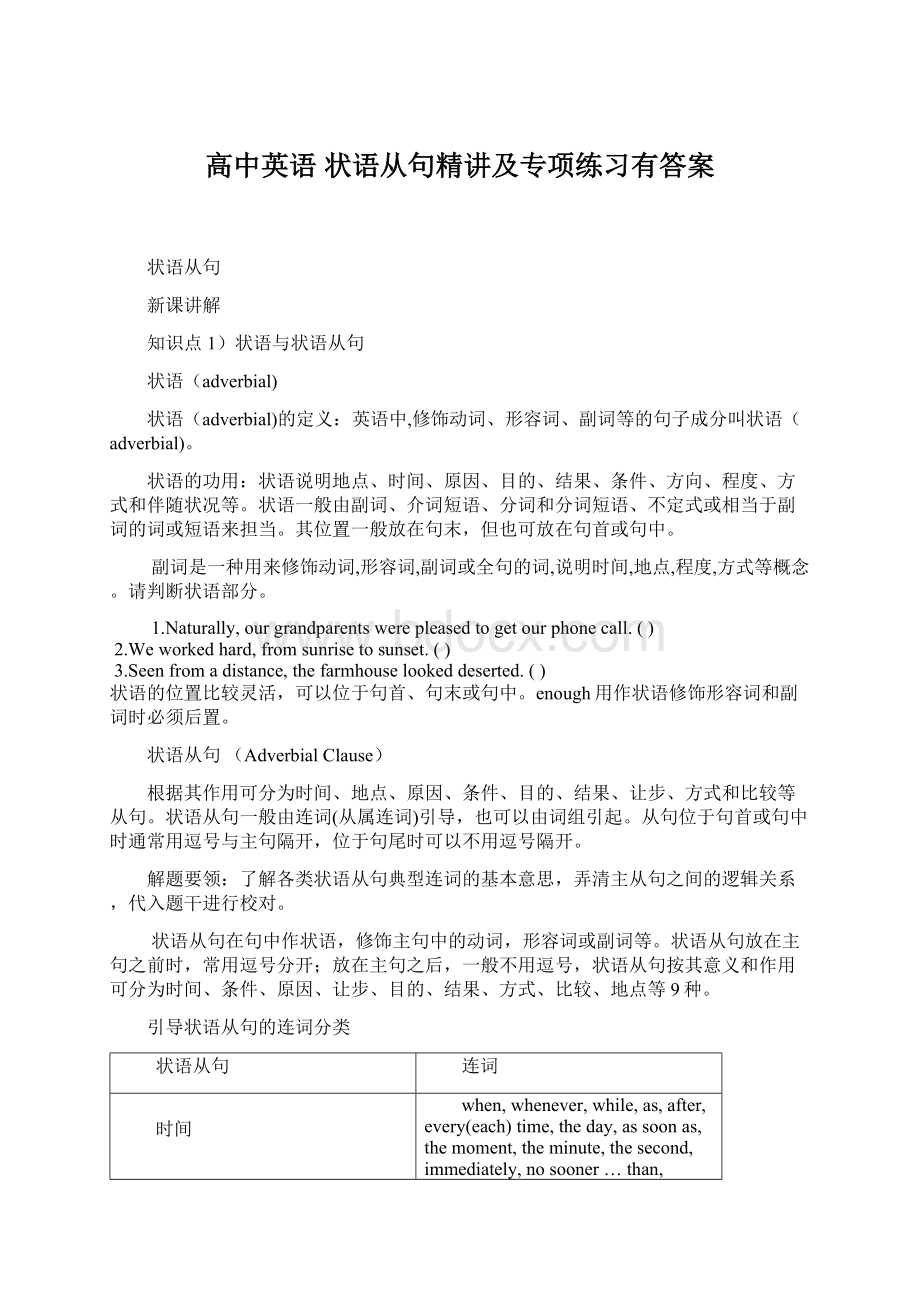高中英语 状语从句精讲及专项练习有答案.docx
《高中英语 状语从句精讲及专项练习有答案.docx》由会员分享,可在线阅读,更多相关《高中英语 状语从句精讲及专项练习有答案.docx(29页珍藏版)》请在冰豆网上搜索。

高中英语状语从句精讲及专项练习有答案
状语从句
新课讲解
知识点1)状语与状语从句
状语(adverbial)
状语(adverbial)的定义:
英语中,修饰动词、形容词、副词等的句子成分叫状语(adverbial)。
状语的功用:
状语说明地点、时间、原因、目的、结果、条件、方向、程度、方式和伴随状况等。
状语一般由副词、介词短语、分词和分词短语、不定式或相当于副词的词或短语来担当。
其位置一般放在句末,但也可放在句首或句中。
副词是一种用来修饰动词,形容词,副词或全句的词,说明时间,地点,程度,方式等概念。
请判断状语部分。
1.Naturally,ourgrandparentswerepleasedtogetourphonecall.()
2.Weworkedhard,fromsunrisetosunset.()
3.Seenfromadistance,thefarmhouselookeddeserted.()
状语的位置比较灵活,可以位于句首、句末或句中。
enough用作状语修饰形容词和副词时必须后置。
状语从句(AdverbialClause)
根据其作用可分为时间、地点、原因、条件、目的、结果、让步、方式和比较等从句。
状语从句一般由连词(从属连词)引导,也可以由词组引起。
从句位于句首或句中时通常用逗号与主句隔开,位于句尾时可以不用逗号隔开。
解题要领:
了解各类状语从句典型连词的基本意思,弄清主从句之间的逻辑关系,代入题干进行校对。
状语从句在句中作状语,修饰主句中的动词,形容词或副词等。
状语从句放在主句之前时,常用逗号分开;放在主句之后,一般不用逗号,状语从句按其意义和作用可分为时间、条件、原因、让步、目的、结果、方式、比较、地点等9种。
引导状语从句的连词分类
状语从句
连词
时间
when,whenever,while,as,after,every(each)time,theday,assoonas,themoment,theminute,thesecond,immediately,nosooner…than,hardly(scarcely)…when,since,before,till,until,once
地点
where,wherever,everywhere
条件
if,unless,as(so)longas,onconditionthat,providing/providedthat,suppose/supposingthat,incase
原因
because,since,as,nowthat,seeingthat,consideringthat,giventhat,inthat,inviewofthefactthat(鉴于)
让步
though,although,evenif(though),while,as,whatever,wherever,whoever,however,nomatter+wh词,whether…or,despitethefactthat
比较
as…as,notthesameas,notso…as,than,themore…themore
方式
as,asif(though)
目的
that,sothat,inorderthat,incase,forfearthat,lest
结果
sothat,so…that,such…that
1.时间和条件状语从句讲求“主将从现”的时态规则,但要注意whether一词。
⏹Whetheritrains(rain)ornot,Ishallgooutforanoutingtomorrow.
⏹Canyoutellmewhetheritwillrain(rain)tomorrow?
⏹Whetheritwilldo(do)usmoreharmthangoodremainstobeseen.
当whether作“无论”解,用现在时表将来。
但当whether作“是否”解时则不能用现在时表将来。
2.注意下列连词的基本释义
assoonas/themoment/directly一……就……
nosooner…than/hardly…when刚……就……
since/nowthat/seeingthat既然
inthat因为;由于
provided/onconditionthat/suppose(ing)如果
once一旦
as/solongas只要
incase以防;万一
giventhat考虑到……
seeingthat鉴于
evenif即便
eventhough尽管
asif/though好象
unless除非,如果不
wh-疑问词+ever/nomatter+wh-疑问词无论……不管……
until到……为止
not…until直到……才
as/sofaras就……而言
asfaras…远至
sothat为了……
so/such…that太……以至于……
知识点2):
状语从句的分类
时间状语从句
时间状语从句的时态一致
(1)如果主句是一般将来时,在时间状语从句中用一般现在时表将来。
(2)如果主句是一般将来时,若时间状语从句强调动作完成,从句也可以用现在完成时。
1、while,as,when/whenever的用法比较
连接词when的用法小结
when(特指)引导的从句表示的具体的时间,从句的动作和主句的动作可以同时,也可以先于主句的动作。
whenever(泛指)指任何一个不具体的时间。
(1)when引导的时间状语从句的谓语动词可以是可延续的,也可以是表短暂性动作的动词,可用于主句和从句动作同时发生或从句动作先于主句动作。
如:
Whenthefilmended,thepeoplewentback.
WhenIlivedthere,IusedtogototheseashoreonSundays.
(2)可用作并列连词,其意义为“那时,这时”,相当于andatthis/thattime。
常用于下列句式:
Somebodywasdoingsomething/wasabouttodosth./wasonthepointofdoingsth.when…(刚要……这时突然……)
(3)还可以表示原因“既然”,相当于since;consideringthat。
如:
Itwasfoolishofyoutotakeataxiwhenyoucouldeasilywalkthereinfiveminutes.
(4)When的意思
1)当…时候
2)那时;这时(突然)
bedoing…when
beabouttodo…when
beonthepointofdoing…when
hadjustdone…when
3)既然(原因状语从句)
Itwasfoolishofyoutotakeataxiwhenyoucouldeasilywalkthereinfiveminutes.
连接词while的用法小结
(1)while引导的动作必须是持续性的,侧重主句动作和从句动作相对比。
如:
Pleasedon’ttalksoloudwhileothersareworking.
(2)while作为并列连词,意为“而,却”,表示对比。
There'splentyofraininthesoutheast,whilethere'slittleinthenortheast.
Somepeoplewastefoodwhileothershaven'tenough.
★注意:
while与but的区别
二者都有“而,然而”之意,但while强调二者的对比,而but强调前后的转折关系。
(3)while可表示尽管,相当于although。
连接词when,while,as的用法区别:
(1)While指一段时间。
表示主句和从句的动作同时发生,并持续一段时间。
从句的谓语动词必须是可延续的。
When指一点时间或一段时间。
表示主句和从句的动作同时发生,也常表示从句动作先于主句动作。
引导的从句的谓语动词是可延续的,也可以是表短暂性动作的动词。
如:
When/Whilehewaseatinghisbreakfast,heheardthedoorbellring.
WhenIstoppedmycar,amancameuptome.(不可用while)
Whenyouhavefinishedyourwork,youmayhavearest.(不可用while)
(2)as指一点时间,以可指一段时间。
侧重于表示在从句动作发生过程中主句动作同时发生。
当主句和从句的主语一致时,as还有“一边…一边…”的意思。
AsIwasgettingonthebus,someonecalledme.
Ashewalkedalong,hesanghappily.
Astheelectionapproached,theviolencegotworse.(表示“随着……”,连词用as,不用when或while)
(3)如果主句表示的是短暂动作,而从句用延续性动作的进行时态表示在一段时间内正在进行的动作时,when,while与as可互换使用。
如:
When/While/AsIwaswalkingdownthestreet,Icameacrossanoldfriendofmine.
2、名词词组引导时间状语从句
有时名词everytime(每次),thenexttime(下一次),bythetime,thenextday(第二天),thefirsttime,everyday,theyear…等,也可起从属连词的作用,引导时间状语从句。
IthoughtherniceandhonestthefirsttimeImether.
Everytimeyougetbackatnight,youdropyourshoesonthefloor.
Ididn'thaveapennythelasttimeIsawyou.
3、表示“一…就”的连词或词组
assoonas
themoment,theminute,thesecond,theinstant…
instantly,immediately,directly,presently…
hardly/scarcely…when,nosooner…than….
I'llgiveyouaphoneassoonasIcomeback.
—DidyouremembertogiveMarythemoneyyouowedher?
你记着还给玛丽的欠款了吗?
—Yes.IgaveittoherthemomentIsawher.是的。
我一见到她就还给她了。
Theyoungladyrushedintotheroomimmediatelysheheardthenoise.那位年轻女士一听到响声就冲进房间。
Directlythemastercamein,everyonewasquiet.校长一进来,大家就安静下来。
Hardlyhadhearrivedwhenshestartedcomplaining.他刚一到,她就开始抱怨起来。
4、since和before的用法比较
两者均可用于“It+be...+since/before-从句”的句型。
区别在于since表示“自从……以来”,所在主、从句的谓语动词的时态关系是:
Itis/hasbeensometimesincesb.didsth.。
Itis/hasbeen30yearssincehejoinedtherevolution.他参加革命己三十年了。
before主、从句的时态关系是:
Itwassometimebeforesb.didsth.过了多久才……和Itwillbesometimebeforesb.doessth.还要过多久才……
Itwasthreedaysbeforehecameback.他三天后才回来。
Itwillbethreedaysbeforehecomesback.他三天后才会回来。
否定句型Itbenot+一段时间+before肯定句“不多久就……”
Itwasnotlongbeforehecameback.不久他就回来了。
Itwasn’ttwoyearsbeforeheleftthecountry.没到两年他就离开这个国家了。
比较记忆:
beforelong不久以后
longbefore很久以前
Theycamebackbeforelong.他们很快就回来了。
IknewTomlongbeforeIknewyou.我在认识你之前很久就认识了汤姆。
5、till/until,not…until
①till/unitl主句谓语动词必须是延续性动词,until=till,但是在句首只能用until
not…until主句的谓语动词经常是非延续性动词,也可以是延续性动词
Theystayedthereuntilwecameback.
Theydidn’tleaveuntilwecameback.
②Itwasnotuntil…that…强调从句时需把not放在从句前面
ItwasnotuntilaSaturdayafternooninMaythathecouldarrangeformetomeethereldersister.
③notuntil在句首时,主句要部分倒装
Notuntilallthefishdiedintheriverdidthevillagersrealizehowseriousthepollutionwas.直到河里的鱼都死了村民们才意识到污染的严重性。
6、once一旦
OnceIarriveinShanghai,Iwillcallyou.
课堂练习
1.Icouldn’tforgether_____Isawher.
A.forthefirsttimeB.forthelasttimeC.foreachtimeD.thefirsttime
2.Jasminewasholidayingwithherfamilyinawildlifepark_____shewasbittenonthelegbyalion.
A.whenB.whileC.sinceD.once
3.Itisalmostfiveyears_____wesaweachotherlasttime.
A.beforeB.sinceC.afterD.when
4.Hemadeamistake,butthenhecorrectedthesituation_____itgotworse.
A.untilB.whenC.beforeD.As
DABC
第2题答案A
解析:
while引导的句子中的谓语动词为延续性动词或状态性动词;
when引导的句子中的谓语动词可为延续性或非延续性动词.bite为非延续性动词,when在此处为并列连词,意为“这时
第3题答案B
分析:
解此题的关键在于主句与从句在时态上保持一致。
用A、C、D三项的连接词引导时间状语从句时,与主句的时态明显不一致。
since引导从句时常用过去时,主句则用一般现在时或现在完成时。
地点状语从句
地点状语从句一般由where,wherever和everywhere引导。
Afterthewar,anewschoolbuildingwasputupwheretherehadoncebeenatheatre.战后,一所新学校在以前的剧院处建成。
Youshouldmakeitaruletoleavethingswhereyoucanfindthemagain.你应当养成惯例,将东西放在你能找到的地方。
Shefoundhercalculatorwhereshelostit.他在她丢的地方找到了计算器。
Everywheretheywent,thedistinguishedguestswerewarmlywelcomed.贵宾每到一处都受到了热烈的欢迎。
Sitwhereveryoulike.请随便坐。
Youcantakeitwithyouwhereveryougo.不论走到什么地方,你都可随身携带它。
Theywentwheretheycouldfindwork._____________从句
TheywenttoBeijing,wheretheycouldfindwork._____________从句
课堂练习
1、Today,wewillbegin________westoppedyesterdaysothatnopointwillbeleftout.
A.whenB.whereC.howD.what
2、unemploymentandcrimearehigh,itcanbeassumedthatthelatterisduetotheformer.
A.BeforeB.WhereC.UnlessD.Until
3、You’dbetternotleavethemedicinekidscanreachit.
A.evenifB.whichC.whereD.sothat
第1题:
B
题意:
今天,我们将从昨天停下的地方开始这样就不会有知识点被漏掉了。
where引导宾语从句,在宾语从句中作状语,因为宾语从句中stopped是不及物动词,不能带宾语。
第2题:
B
第3题:
C
原因状语从句
原因状语从句一般由because(因为),since(既然),nowthat(既然,因为),as(由于)等连词引导
1、because,since,nowthat和as引导原因状语从句
(1)because
表示直接的原因或理由,表示原因的语气最强,常表示必然的因果关系。
回答以why引起的特殊疑问句,只能用because。
Janeworearaincoatbecauseitwasraining.因为天下雨,所以詹穿着雨衣。
Heisabsenttodaybecauseheisill.他今天缺课,因为他病了。
(2)since
表示对方已经知晓、无须加以说明的原因或事实,语气比because稍弱。
I'lldoitforyousinceyouarebusy.既然你忙,我来替你做吧。
Sinceyouinsist,I'llgo.既然你坚持,那我就去。
Sinceyouhaveseenbothfighters,whodoyouthinkwillwin?
(3)nowthat
意为“既然”,与since同义,但更突出事实本身。
Nowthatyou’vegotachance,youmightaswellmakefulluseofit.既然你有了机会,你要充分利用它。
Nowthateveryoneishere,let'sbeginourmeeting.既然大家都来了,我们就开始开会吧。
NowthatIamwellagain,Icangoonwithmywork.我既然恢复了健康,那就可以继续工作了。
(4)as
表示的往往是十分明显的原因,听者或读者已经知道或能看得出来,语气较弱,只附带说明,比较口语化。
Wehadbetterhurryasit'sgettingdark.因为天快要黑了,我们最好快点。
Asyouobject,I'llchangetheplan.由于你反对,我将改变计划。
Asitisraining,I'llnotgoout.因为正在下雨,我就不出去了。
(5)for
for是并列连词,它引导的分句不表示直接的原因,而是用来附带解释或说明前面一句的情况。
for引导的分句常位于第一分句之后,它们之间用逗号隔开。
Itmusthaverainedlastnight,forthegroundiswetthismorning.昨晚准是下雨了,今天早上地面还是湿的。
Thedaybreaks,forthebirdsaresinging.小鸟在歌唱,一定是天亮了。
2、seeingthat,consideringthat,giventhat,inviewofthefactthat和inthat引导原因状语从句
这几个连词同since,as近义,都有“鉴于某个事实,原因”是之意。
Consideringthathe'sonlybeenlearningEnglishayear,hespeaksitverywell.鉴于他只学了一年,他英语讲得就是很好。
Seeingthathewasill,theysentforthedoctor.鉴于他病情严重,他们派人请医生。
Inthatsheisill